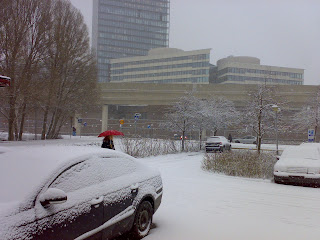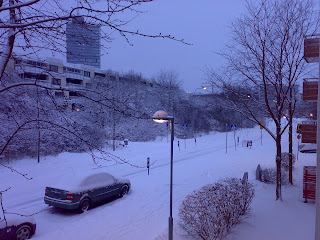Here are two poems I came across recently.
The first one is from Master Zind(a) Koul, one of the mystic poets from Kashmir. The poems is in Kashmiri, so I wrote roman transliteration (line 2 of every stanza) and created the Devanagari (line 1 of every stanza) on http://www.hindikalam.com. I have also tried to do a more or less literal English translation (line 3 of every stanza). The idea was to convey the literal meaning only. I made little effort to keep any form of rhyme and none for the metre. Might try that another time. I am not really good at either Kashmiri (can hardly speak) or poetry, so any corrections/suggestions are welcome.
This poem is called Samran (Remembrance) and won the Sahitya Akademi award for the author. Here it goes.
1)
सुमिरन पनुन मेय दिचुनम लोलुक निशान वेसिये
रुचरुम तोगुम ना रोवुम औसोम ना बान वेसिया
Sumiran panun mey dichunam loluk nishaan vesiye
Ruchrum togum na rovum ausom na baan vesiya
He left me his remembrance, a sign of his love
I Lost it my dear, didn't have a safe place, a hidden cove
2)
पथ कलिये छुम ने दयुतमुत सवन मौखता दान वेसियेह
आयनेय सारेय कया लबख वयने तिम मौखता दान वेसियेह
Path kaliye chhum ne dyutmut swan maukhta daan vesiyeh
Aayney saarey kya labakh vayane tim maukhta daan vesiyeh
In times past, did I ever give, gold and pearls away
Poor blind me, how can I now see, where the pearls lay
3)
वैनेयिजि मैनज़े थोवुन घोचा, हावुन थोवुम अथस पयठ
रह कयुअसे छ कोर मेह पानस नौकसाना पान वेसियेह
Vaineyiji mainze thovun ghocha, haavun thovum athas pya\th
Rah kyuase chh kor meh paanas nauksaana paan vesiyeh
Should have hid deep it in the heart, where the secrets lay,
In a show of rich pride, put it on my palm, and gave it away
4)
हवुन छुह रावरावुन, छावुक समर छुह खैमि
थावन छ छावा बापत, बानन त ठान वेसियेह
Havun chhuh raavraavun, chhaavuk samar chhuh khaimi
Thaavan chh chhaava baapat, baanan t \thaan vesiyeh
To show is to lose, I know it now, what is precious you must hide,
The the dish is on boil, allow it to roil, but keep the lid tight.
5)
येने सुह निशान रोवुम, तेने मच गमिच चे फ़ुलवह
नयुन होन त कहन ति फ़ेरान छस वान वान वेसियेह
Yene suh nishaan rovum, tene mach gamich che fulvah
Nyun hon t kahn ti feraan chhas vaan vaan vesiyeh
The sign now lost, despondent me, I wander everywhere,
Asking the everysame thing, did you glimpse it, anywhere dear
6)
REPLY:
यछ पछ म हार बयाखा हयथ यूर वाति कँनछा
तस छा कमि निशनन, बयय बयय खज़ान वेसिये
Ychh pchh m haar byaakha hyath yoor vaati k\mnchha
Tas chha kami nishanan, byay byay khazaan vesiye
Don't lose hope Friend, someone brings it, I know it will be soon,
Does he lack signs, the giver of all treasures, under sun and moon
7)
ड़ोलान कोहन वनन मनज़ शोलन छ गुलशनन मनज़
जयोतन छ तारकन मनज़, कयतयह निशन वेसियेह
\Rholaan kohan vanan manz sholan chh gulshanan manz
Jyotan chh taarakan manz, kaytyah nishan vesiyeh
They wander in plains and fields, bloom in flowers, gardens and vines
They sparkle in the stars and planets, they are uncountable, the signs.
8)
वेसेरिथ देलिथ पथर पयथ बुथ कया दिमव तेमिस निश
पोथ फेरनिकि पकान छा यिथ ही बहान वेसियेह
Veserith delith pathar pyath buth kya dimav temis nish
Poth pherniki pakaan chha yith hee bahaan vesiyeh
You say, you lost your way, have broken down, how to show him your face
To turn back now, Is it the really fair, the excuse is not good enough
9)
मनव ज़ि आस हैवुमव पथ चोरया तसुनध मोहब्बत
पयवनध ये आदनुक चह शुरये दोसतान वेसियेह
Manav zi aas haevumav path chorya tasundh mohabbat
Pyavandh ye aadnuk chah shurye dostaan vesiyeh
Even if we turn back, can we lose his love, in this easy way
A bond unbreakable, the ground of our being, it is no childs play?
10)
दिल फुटयमतयन छु तोशन, यच गरिमतयन छु रोशन,
गछि वेरिमतयन सुदामन, परछ गायिबान वेसियेह
Dil phu\tymatyn chhu toshan, yach garimatyan chhu roshan,
Gachhi verimatyan sudaaman, prachh gaayibaan vesiyeh
He is the healer of broken heart, and the tamer of the proud mind
If you don't trust me, ask sudaama, or some true lover you find.
11)
आनध पख तति छु आसन बवध बरोर सुरदासुन
बोज़ान छुह माय लेगिथ लोलुकै तरान वेसियेह
Aandh pakh tati chhu aasan bvadh bror surdaasun
Bozaan chhuh maay legith lolukai taraan vesiyeh
Everpresent, invisible, the playful child of surdas, wanders about and above.
With great joy and merriment, hears these songs, sung of love.
I don't think there are any copyright issues in posting the orignal, but in case you feel there are please let me know
The second one is a Pakistani poet by name of Kateel Shafai. Found the poem on the website www.kavitakosh.org. Among Pakistani peots I personally like Faiz Ahmed Faiz the most. Discovered Kateel only a couple of weeks back and liked his use of simple language. Here is the poem and the translation by yours truly. Tried to keep as close the original literal meaning as possible, without sounding too awkward
पहले तो अपने दिल की रज़ा जान जाइये
फिर जो निगाह-ए-यार कहे मान जाइये
First learn you must, of your hearts way
then do as the beloved's eyes do say,
पहले मिज़ाज-ए-राहगुज़र जान जाइये
फिर गर्द-ए-राह जो भी कहे मान जाइये
First know where the travellers mood may be
Then accept what the road's dust decree.
कुछ कह रही है आपके सीने की धड़कने
मेरी सुनें तो दिल का कहा मान जाइये
Something my dear, your heartbeats whispered now
If you may heed my suggestion, do follow it love
इक धूप सी जमी है निगाहों के आस पास
ये आप हैं तो आप पे क़ुर्बान जाइये
The sun is blinding my eyes, I guess,
Or is it you, the one I want to bless.
शायद हुज़ूर से कोई निस्बत हमें भी हो
आँखों में झाँक कर हमें पहचान जाइये
I wonder if your friend I may possibly be.
Look deeply in my eyes and recognize me
Now comes the customary homage to Colonel. For Colonel poetry is pronounced (and also written and thought and cooked and devoured and ...) as poultry. Those two words are equivalent entities (isomorphisms to use the mathematical term) in his dictionary. And though poetry can have fairly interesting mathematical structure in metre and rhyming, I have for some reason been unable to evince his interest towards its non-avian properties. And though I like chicken, I am not all that fond of those birds to waste a couple of hours on it. So my interest or inspiration (or perversion if you may like to call that) comes from elsewhere. Who or what that may be will have to wait for some other day...
 Monet's "From the mouth of Schelde"
Monet's "From the mouth of Schelde"

 Alfred Sisley's "Landscape from Bougivil", 1873
Alfred Sisley's "Landscape from Bougivil", 1873 Adolphe Monticelli's "Party Strolling In Park With a Dog"
Adolphe Monticelli's "Party Strolling In Park With a Dog"

 Paul Gauguin "landscape from arles", 1888
Paul Gauguin "landscape from arles", 1888 Near my apartment
Near my apartment
 My office building
My office building From my office window. Adobe Technologies building. Major major major... mentioned the purpose of windows seats in offices in japan. Thankfully this is not japan.
From my office window. Adobe Technologies building. Major major major... mentioned the purpose of windows seats in offices in japan. Thankfully this is not japan. From the front window..
From the front window..